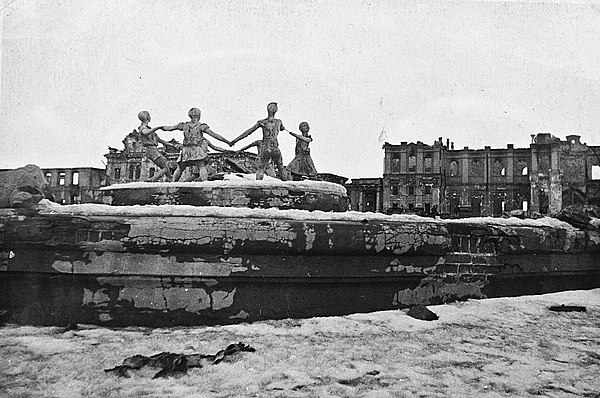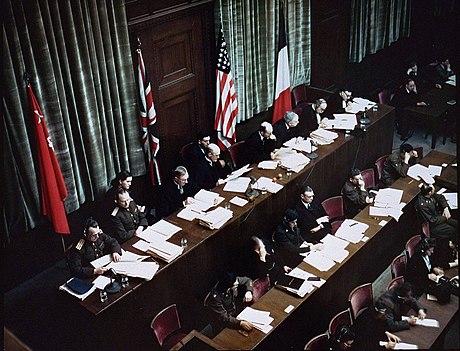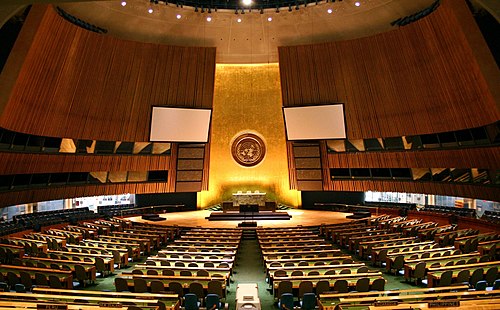Browse By Unit
Caleb Lagerwey
Caleb Lagerwey
The Role of the United States
Explain the consequences of U.S. involvement in World War II.
After defeating the Axis powers (Germany, Italy, and Japan) in WWII the United States was on top of the world. It was the only major war power to not have suffered fighting on its land, plus it had lost a relatively smaller number of soldiers (418,000) compared to some of its allies. On the other hand, The USSR probably lost around 10,000,000 soldiers and an equal number of civilians.

Image Courtesy of Wikipedia
Postwar Agreements
The United States dominated war-ravaged Asia and Europe politically and economically and used this power to shape much of the post-war world and agreements.
The Paris Peace Treaties were a series of international agreements signed in the French capital, Paris, in 1947 and 1948, that officially ended World War II and established the post-war order in Europe. The Treaty of Peace with Italy stripped Italy of its colonies, its empire, and its territories, and reduced its military capabilities. The Treaty of Peace with Japan imposed restrictions on Japan's military and territorial holdings and required reparations to be paid to the countries that had been occupied by Japan during the war. In some countries, these agreements were seen as harsh and punitive, and they did not bring the peace and stability that was expected.
One of the most important agreements was the Nuremberg Trials. The Nuremberg Trials were a series of military tribunals meant to prosecute prominent leaders of Nazi Germany for war crimes, crimes against peace, and crimes against humanity. The trials included representatives from the United States, the Soviet Union, Great Britain, and France, Many were found guilty of systematically killing Jews - known as the Holocaust.

Image Courtesy of Wikipedia
After World War II, Germany was divided into four occupation zones, each controlled by one of the victorious Allied powers: the United States, the Soviet Union, Great Britain, and France. The dividing line between the Western and Eastern zones of occupation was the Elbe river, with the Western zones to the west of the Elbe and the Soviet zone to the east. The purpose of dividing Germany was to prevent it from becoming a powerful nation again and to weaken it permanently, as well as to extract reparations from the country. The idea was to rebuild and demilitarize the country and make it into a peaceful democracy. However, it would lead to the rise of the Cold War and the creation of two opposing political systems: capitalism and communism.
The United Nations
The United States also joined the United Nations. The UN was established after World War II, in the wake of the atrocities of the Holocaust and the devastation of the war. The UN Charter, which was signed by 51 countries in San Francisco on June 26, 1945, sets out the organization's purposes and principles, including the promotion of human rights, the peaceful resolution of disputes, and the provision of humanitarian assistance. The UN also adopted the Universal Declaration of Human Rights which set out the fundamental rights and freedoms that are entitled to all human beings, regardless of race, gender, religion, or any other status. The United States joining the UN, unlike the post-WWI League of Nations, made the UN more successful in its peacekeeping goals.

Image Courtesy of Wikipedia
The US also controlled the post-1945 economic system set up at the Bretton Woods Agreement. The agreement pegged the value of all currencies to the U.S. dollar - and gave the US economic control. The US was a major voice in the World Bank and International Monetary Fund set up by that conference as well. The dollar was the currency of choice and the medium of exchange for much of the world’s economy.
The US was the only country with nuclear weapons (so far…)—this is called a nuclear monopoly—and used those weapons to face off against a former ally with a large army that the US began to distrust more and more - the USSR.
This next chapter of tension with the Soviet Union would be known as the Cold War (see Period 8 guide). The war-ravaged condition of Asia and Europe, and the dominant U.S. role in the Allied victory and postwar peace settlements, allowed the United States to emerge from the war as the most powerful nation on Earth.
🎥 Watch: AP US History - Period 7 Review
<< Hide Menu
Caleb Lagerwey
Caleb Lagerwey
The Role of the United States
Explain the consequences of U.S. involvement in World War II.
After defeating the Axis powers (Germany, Italy, and Japan) in WWII the United States was on top of the world. It was the only major war power to not have suffered fighting on its land, plus it had lost a relatively smaller number of soldiers (418,000) compared to some of its allies. On the other hand, The USSR probably lost around 10,000,000 soldiers and an equal number of civilians.

Image Courtesy of Wikipedia
Postwar Agreements
The United States dominated war-ravaged Asia and Europe politically and economically and used this power to shape much of the post-war world and agreements.
The Paris Peace Treaties were a series of international agreements signed in the French capital, Paris, in 1947 and 1948, that officially ended World War II and established the post-war order in Europe. The Treaty of Peace with Italy stripped Italy of its colonies, its empire, and its territories, and reduced its military capabilities. The Treaty of Peace with Japan imposed restrictions on Japan's military and territorial holdings and required reparations to be paid to the countries that had been occupied by Japan during the war. In some countries, these agreements were seen as harsh and punitive, and they did not bring the peace and stability that was expected.
One of the most important agreements was the Nuremberg Trials. The Nuremberg Trials were a series of military tribunals meant to prosecute prominent leaders of Nazi Germany for war crimes, crimes against peace, and crimes against humanity. The trials included representatives from the United States, the Soviet Union, Great Britain, and France, Many were found guilty of systematically killing Jews - known as the Holocaust.

Image Courtesy of Wikipedia
After World War II, Germany was divided into four occupation zones, each controlled by one of the victorious Allied powers: the United States, the Soviet Union, Great Britain, and France. The dividing line between the Western and Eastern zones of occupation was the Elbe river, with the Western zones to the west of the Elbe and the Soviet zone to the east. The purpose of dividing Germany was to prevent it from becoming a powerful nation again and to weaken it permanently, as well as to extract reparations from the country. The idea was to rebuild and demilitarize the country and make it into a peaceful democracy. However, it would lead to the rise of the Cold War and the creation of two opposing political systems: capitalism and communism.
The United Nations
The United States also joined the United Nations. The UN was established after World War II, in the wake of the atrocities of the Holocaust and the devastation of the war. The UN Charter, which was signed by 51 countries in San Francisco on June 26, 1945, sets out the organization's purposes and principles, including the promotion of human rights, the peaceful resolution of disputes, and the provision of humanitarian assistance. The UN also adopted the Universal Declaration of Human Rights which set out the fundamental rights and freedoms that are entitled to all human beings, regardless of race, gender, religion, or any other status. The United States joining the UN, unlike the post-WWI League of Nations, made the UN more successful in its peacekeeping goals.

Image Courtesy of Wikipedia
The US also controlled the post-1945 economic system set up at the Bretton Woods Agreement. The agreement pegged the value of all currencies to the U.S. dollar - and gave the US economic control. The US was a major voice in the World Bank and International Monetary Fund set up by that conference as well. The dollar was the currency of choice and the medium of exchange for much of the world’s economy.
The US was the only country with nuclear weapons (so far…)—this is called a nuclear monopoly—and used those weapons to face off against a former ally with a large army that the US began to distrust more and more - the USSR.
This next chapter of tension with the Soviet Union would be known as the Cold War (see Period 8 guide). The war-ravaged condition of Asia and Europe, and the dominant U.S. role in the Allied victory and postwar peace settlements, allowed the United States to emerge from the war as the most powerful nation on Earth.
🎥 Watch: AP US History - Period 7 Review

© 2024 Fiveable Inc. All rights reserved.